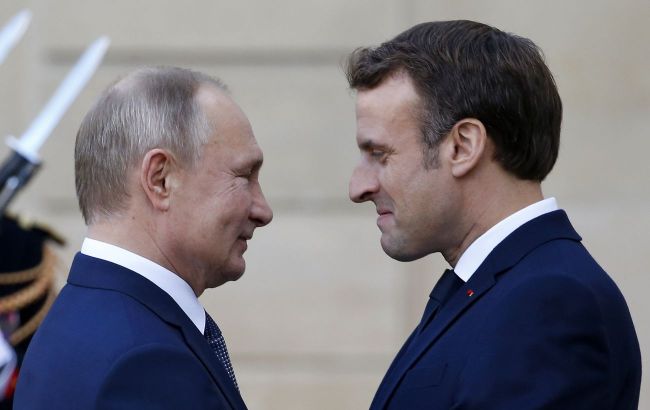Why Macron calls Putin and what Trump has to do with it: Ukrainian expert's explanation
 Photo: French President Emmanuel Macron and Russian President Vladimir Putin (Getty Images)
Photo: French President Emmanuel Macron and Russian President Vladimir Putin (Getty Images)
The conversation between French President Emmanuel Macron and Russian President Vladimir Putin did not change the negotiation dynamics and was more symbolic than practical in nature, states political analyst Volodymyr Fesenko in a comment to RBC-Ukraine.
"Actually, there is nothing surprising here. Last year, similar attempts were made by (former German Chancellor Olaf - ed.) Scholz. That was a clear false start at the time. And it brought no good to Scholz and in no way influenced the peace process or the start of peace negotiations. Because Putin does not take Scholz seriously. And this is exactly what Macron failed to understand," the expert said.
He added that the Russian President traditionally ignores European politicians.
"Among Western leaders, he now only respects (US President Donald - ed.) Trump," Fesenko emphasized.
According to the expert, Macron "felt a pause" in the peace process and decided to create an informational occasion to show himself not only as a partner of Ukraine but also as a politician ready for diplomacy.
Fesenko stresses that this does not mean an attempt to "betray" Kyiv or to negotiate with the Kremlin behind its back.
"This is a way to show both Trump and part of the French public that Macron is not belligerent, that he supports the peace process," he emphasized.
The political strategist also points out that for the French president, the priority was the Middle East topic, where criticism in Europe is growing against the harsh actions of Israel and the US. Thus, Macron "positioned himself as a supporter of diplomatic methods."
Fesenko believes that the main conclusion of the call is yet another confirmation of the Kremlin’s unwillingness to compromise.
"Putin demonstrated his traditional stance — he does not want to negotiate now. European leaders need to apply pressure carefully and delicately, but convince Trump that simply pleading with Putin will not bring results. Putin is not ready to stop the fighting. Therefore, pressure must be applied to him," he said.
Fesenko added that it now makes sense at least to demonstrate the US's readiness to impose sanctions against Russia.
"I’m referring to Lindsey Graham’s bill. At least to show this," he noted.
According to the expert, it is important for Macron to remain an "active European player" capable of maintaining dialogue with Trump, Ukrainian President Volodymyr Zelenskyy, and Putin, since his presidential term in France is coming to an end, but his political career may continue on the international stage.
Fesenko sums up that the call was "at best a way to probe" Moscow’s mood.
"Macron tried — and now he has an argument: ‘I called for a ceasefire, but Putin is not ready.’ Therefore, pressure needs to be increased," the political strategist concluded.
Macron and Putin’s conversation
On July 1, Macron spoke by phone with Russian President Vladimir Putin for the first time in almost three years. Among the key topics was Russia’s war against Ukraine. Putin, as before, shifted the blame onto the West, repeating the claim that Western policies allegedly provoked the conflict and continue to support it.
In response, Macron emphasized the need for an immediate ceasefire to create conditions for launching a peace process that would be long-term and stable.

